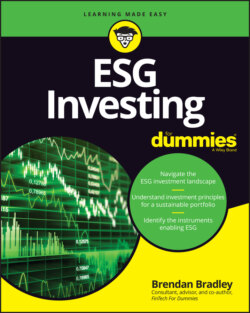Читать книгу ESG Investing For Dummies - Brendan Bradley - Страница 12
Surveying the Current ESG Landscape
ОглавлениеBroadly defined as the analysis of a company’s environmental, social, and governance practices, ESG first grabbed the financial world’s attention following a 2005 United Nations Global Compact report, which claimed that incorporating ESG factors into capital markets would make it possible to “do well by doing good.” Since then, the significance of ESG issues has experienced a meteoric rise. The Principles for Responsible Investment (PRI) network of investors, which was introduced in 2006, has grown from 63 asset manager and owner signatories with US$6.5 trillion in assets under management to more than 3,000 signatories with over US$103 trillion in assets under management. Driven by increased stakeholder attention to corporate environmental impacts and investors realizing that strong ESG performance can safeguard a company’s success, ESG is no longer a niche investment concept.
As the world is changing, there is a greater requirement to understand what risks or opportunities a company faces from ESG issues that may determine its long-term prospects. The COVID-19 pandemic has highlighted the need to consider these factors even further, hence the recent surge in investments in this space. Even within this century, the context in which businesses operate has changed radically. Businesses have generally profited from economic growth, globalization, increased consumption, and fossil fuels, and have strengthened and developed their role as the major providers of goods, jobs, and infrastructure worldwide. Consequently, their contribution to essential sustainability issues, such as climate change, biodiversity, social diversity, and inclusion, has also grown. Concurrently, the rise of technology has allowed stakeholders, as well as shareholders, to challenge businesses on how they behave.
Consequently, transparent measurement and disclosure of sustainability performance is now deemed to be an essential part of effective business practices, and a necessity for maintaining trust in business as a force for good. Corporate reporting is a means by which stakeholders, including investors, can identify and measure companies’ performance, just as companies themselves use reporting internally to inform decision-making. Financial reporting has developed as a result of internationally recognized accounting standards that bring transparency, accountability, and competence to financial markets around the world. Therefore, while sustainability disclosure is inevitably more complex than financial reporting, internationally recognized sustainability standards will be the basis for calculating relevant ESG ratings.
